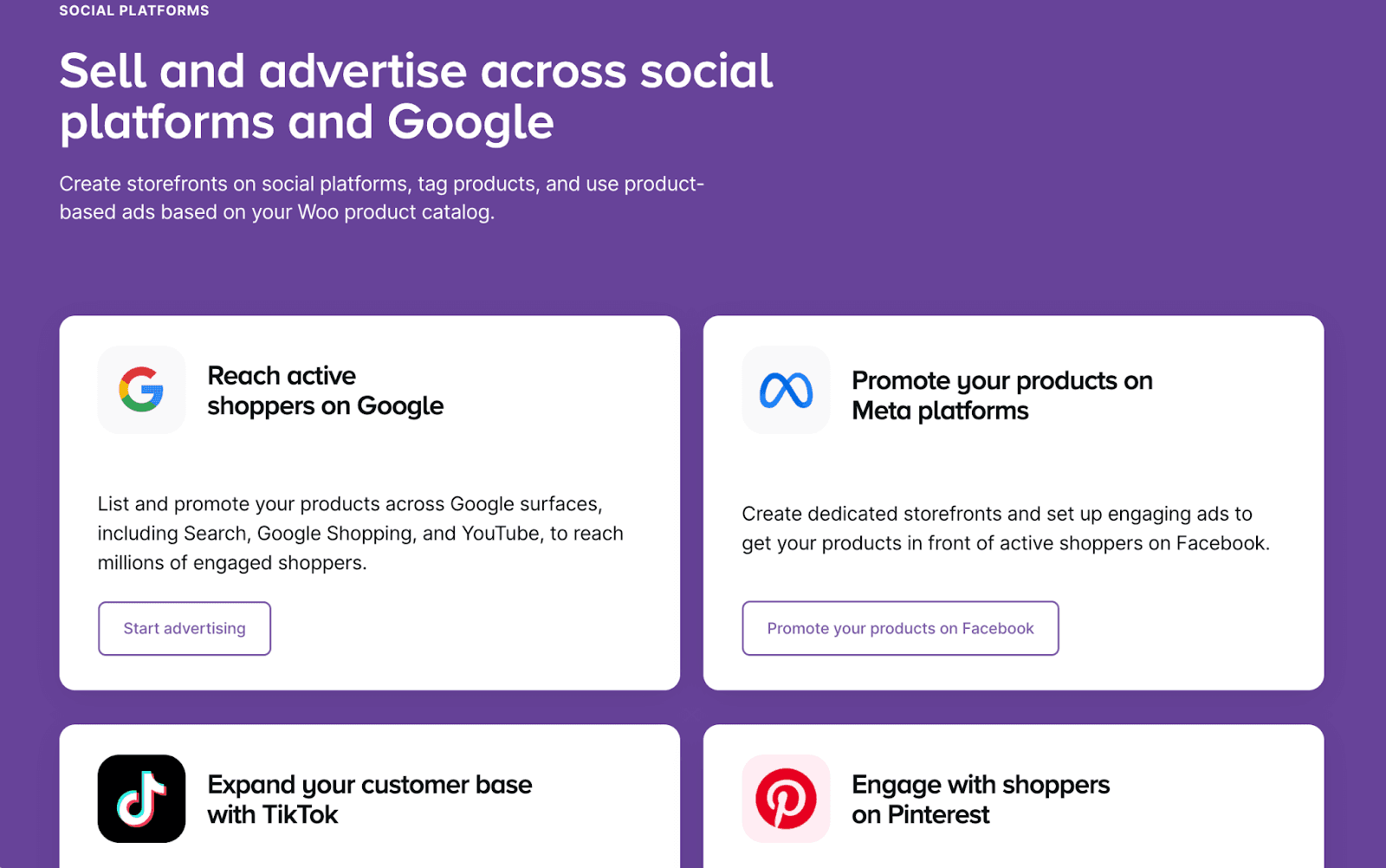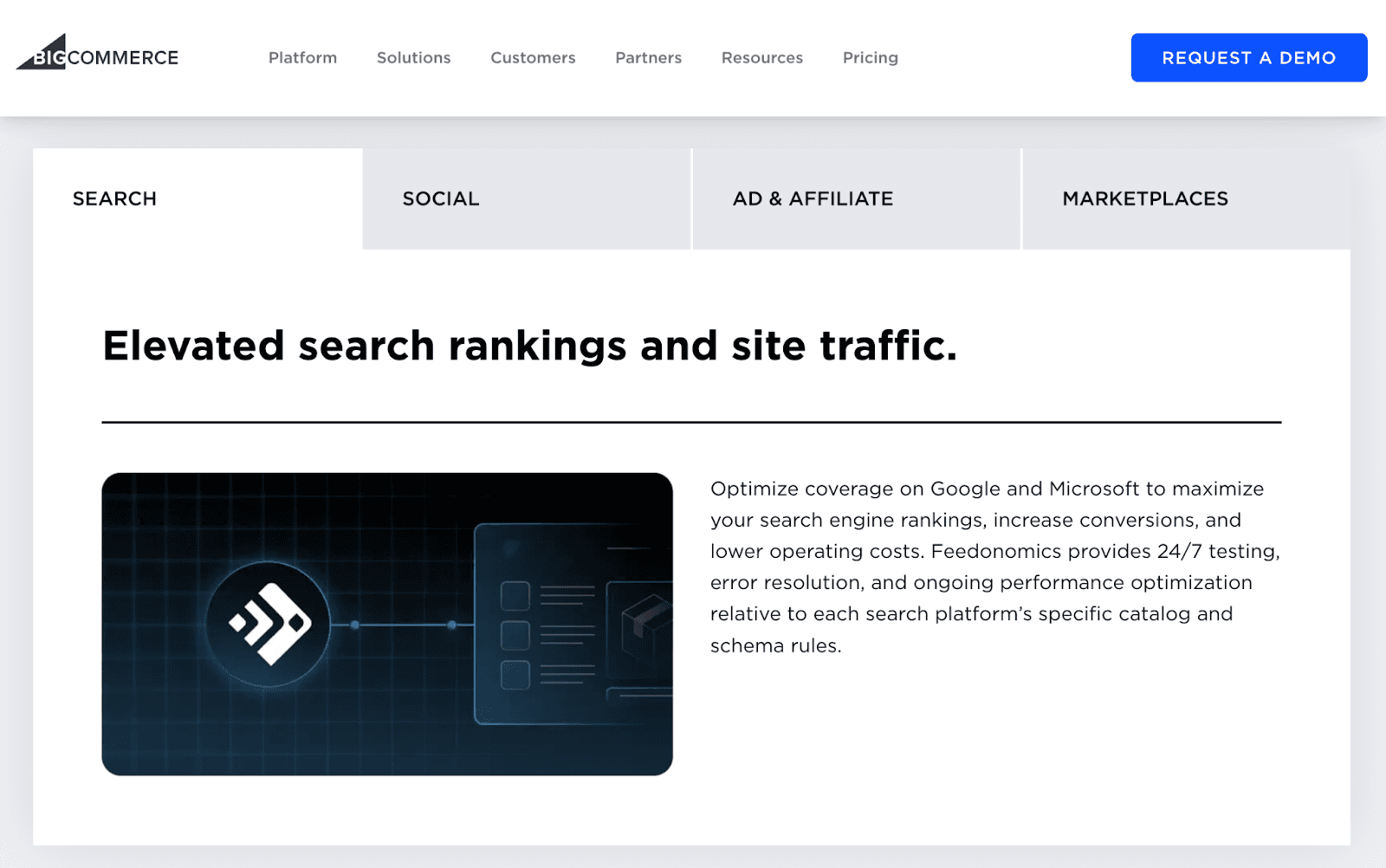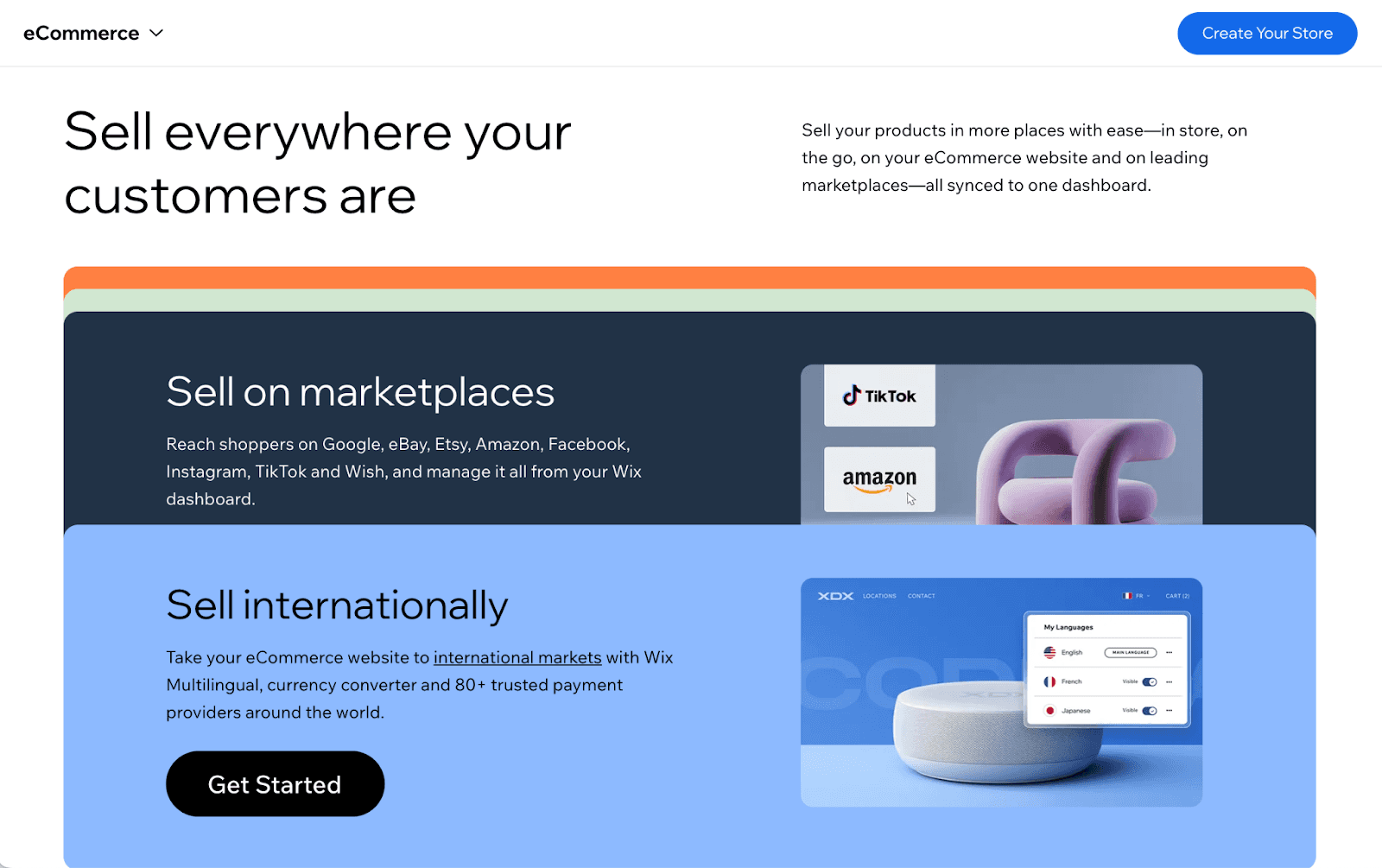E-Commerce SEO
The 4 Best E-Commerce Platforms for SEO
The 4 Best E-Commerce Platforms for SEO
The 4 Best E-Commerce Platforms for SEO
The 4 Best E-Commerce Platforms for SEO
These platforms offer the right mix of features for e-commerce and SEO: 1. WooCommerce • 2. Shopify • 3. BigCommerce • 4. Wix eCommerce
These platforms offer the right mix of features for e-commerce and SEO: 1. WooCommerce • 2. Shopify • 3. BigCommerce • 4. Wix eCommerce
Search Engine Optimization is a crucial sales channel for an ecommerce business. In fact, it’s estimated that ecommerce sites obtain about 33% of their traffic from organic search results!
This means that any platform you choose to build your website on matters, which is why we’re breaking down the top 4 ecommerce platforms based on their SEO features.
Which eCommerce Platform is Best for SEO?
The following platforms offer the right mix of features for e-commerce and improving your site’s search engine rankings:
WooCommerce
Shopify
BigCommerce
Wix eCommerce
In this guide, we will explore each of these options to help you find the best fit for your business depending on your current needs and growth stage.
1. WooCommerce

WooCommerce is the most widely used e-commerce platform. It’s built on top of the WordPress content management system (CMS), so you get access to a wide variety of advanced SEO tools and plugins maintained by a large, active community.
Ease of Use: It offers deep customization but requires familiarity with WordPress and a basic understanding of plugins, which can pose a learning curve for beginners. But if you’re willing to DIY, there are plenty of forums and tutorials to help you through it.
Scalability: Users can adjust themes, plugins, and hosting plans as their store grows, though larger stores may need more technical management.
Cost: WooCommerce itself is free but other expenses can include hosting, premium plugins, and developer support for custom setups.
2. Shopify
Designed specifically for e-commerce, Shopify is a popular choice for both big businesses and small business owners, as well as startup brands who want to launch quickly. Shopify stores benefit from a rich ecosystem of developers and designers, and it’s easy to find apps and tools to help improve your site’s SEO.
SEO Features: Shopify’s built-in features make it easy to optimize product pages for search rankings and visibility on search engine snippets. You can also create a blog for your store, although users looking to create and publish a large amount of blog posts may find its URL structure and capabilities insufficient.
Ease of Use: The platform is intuitive and beginner-friendly, allowing users to set up their online store and implement SEO without a steep learning curve.
Scalability: While Shopify can grow with your business, those requiring extensive content or custom features might need to invest in additional apps and site development.
Cost: Basic plans start affordably, but costs can increase with the need for paid plugins and premium themes.
3. BigCommerce

BigCommerce is a powerful e-commerce platform designed for larger businesses and enterprises that need advanced features and flexibility as they grow. It’s not typically recommended for small startups unless you have a clear plan for scaling your business quickly.
SEO Features: BigCommerce comes with built-in SEO features like customizable URLs, 301 redirects, and support for rich snippets to enhance product visibility in search results. You can also integrate it with SEO tools and apps.
Ease of Use: There are no-code and low-code features but if you want to take full advantage of the platform, you’ll need technical knowledge or third-party help to create customizations and complex setups.
Scalability: BigCommerce is ideal for businesses that expect to scale since it can accommodate increased traffic and a larger product catalog. As your store expands, BigCommerce offers the flexibility to adjust your setup accordingly while maintaining your site’s SEO.
Cost: BigCommerce is a comprehensive e-commerce solution, so it may come with higher monthly fees compared to simpler platforms. You'll also want to factor in the potential costs for additional features, integrations, or developer assistance if needed.
4. Wix eCommerce

Wix eCommerce is a user-friendly platform built on the popular visual website builder, Wix. With over 500 store templates to choose from, it offers a wide range of design options to suit different business needs. Wix themes are automatically optimized for mobile devices to provide a seamless shopping experience for customers on the go. Mobile-optimized sites mean extra points for your SEO!
SEO Features: Wix has built-in tools like customizable URLs, meta tags, and a robots.txt editor to manage how search engines crawl your site. It also supports multilingual sites and integrations with SEMRush and Google Business Profile.
Ease of Use: Its drag-and-drop interface makes it incredibly easy for beginners to set up and manage their online stores without technical skills.
Scalability: While great for small businesses, users should consider their long-term growth plans because scaling might require additional features or custom solutions beyond what Wix can offer.
Cost: Wix offers various pricing plans, making it accessible for startups and small businesses, though advanced features may come at a premium.
E-commerce SEO doesn't end with simply moving your website to a new platform; it’s what you do with that platform that plays a critical role in your search success.
The bottom line? You can find examples of highly successful e-commerce websites for every one of these platforms. At the end of the day, there are bigger levers for SEO success than your platform, such as high-quality content, backlinks, or customer reviews.
However, your platform will play a larger role in larger-scale businesses, businesses already advanced in SEO, and in determining your workflows.
Search Engine Optimization is a crucial sales channel for an ecommerce business. In fact, it’s estimated that ecommerce sites obtain about 33% of their traffic from organic search results!
This means that any platform you choose to build your website on matters, which is why we’re breaking down the top 4 ecommerce platforms based on their SEO features.
Which eCommerce Platform is Best for SEO?
The following platforms offer the right mix of features for e-commerce and improving your site’s search engine rankings:
WooCommerce
Shopify
BigCommerce
Wix eCommerce
In this guide, we will explore each of these options to help you find the best fit for your business depending on your current needs and growth stage.
1. WooCommerce

WooCommerce is the most widely used e-commerce platform. It’s built on top of the WordPress content management system (CMS), so you get access to a wide variety of advanced SEO tools and plugins maintained by a large, active community.
Ease of Use: It offers deep customization but requires familiarity with WordPress and a basic understanding of plugins, which can pose a learning curve for beginners. But if you’re willing to DIY, there are plenty of forums and tutorials to help you through it.
Scalability: Users can adjust themes, plugins, and hosting plans as their store grows, though larger stores may need more technical management.
Cost: WooCommerce itself is free but other expenses can include hosting, premium plugins, and developer support for custom setups.
2. Shopify
Designed specifically for e-commerce, Shopify is a popular choice for both big businesses and small business owners, as well as startup brands who want to launch quickly. Shopify stores benefit from a rich ecosystem of developers and designers, and it’s easy to find apps and tools to help improve your site’s SEO.
SEO Features: Shopify’s built-in features make it easy to optimize product pages for search rankings and visibility on search engine snippets. You can also create a blog for your store, although users looking to create and publish a large amount of blog posts may find its URL structure and capabilities insufficient.
Ease of Use: The platform is intuitive and beginner-friendly, allowing users to set up their online store and implement SEO without a steep learning curve.
Scalability: While Shopify can grow with your business, those requiring extensive content or custom features might need to invest in additional apps and site development.
Cost: Basic plans start affordably, but costs can increase with the need for paid plugins and premium themes.
3. BigCommerce

BigCommerce is a powerful e-commerce platform designed for larger businesses and enterprises that need advanced features and flexibility as they grow. It’s not typically recommended for small startups unless you have a clear plan for scaling your business quickly.
SEO Features: BigCommerce comes with built-in SEO features like customizable URLs, 301 redirects, and support for rich snippets to enhance product visibility in search results. You can also integrate it with SEO tools and apps.
Ease of Use: There are no-code and low-code features but if you want to take full advantage of the platform, you’ll need technical knowledge or third-party help to create customizations and complex setups.
Scalability: BigCommerce is ideal for businesses that expect to scale since it can accommodate increased traffic and a larger product catalog. As your store expands, BigCommerce offers the flexibility to adjust your setup accordingly while maintaining your site’s SEO.
Cost: BigCommerce is a comprehensive e-commerce solution, so it may come with higher monthly fees compared to simpler platforms. You'll also want to factor in the potential costs for additional features, integrations, or developer assistance if needed.
4. Wix eCommerce

Wix eCommerce is a user-friendly platform built on the popular visual website builder, Wix. With over 500 store templates to choose from, it offers a wide range of design options to suit different business needs. Wix themes are automatically optimized for mobile devices to provide a seamless shopping experience for customers on the go. Mobile-optimized sites mean extra points for your SEO!
SEO Features: Wix has built-in tools like customizable URLs, meta tags, and a robots.txt editor to manage how search engines crawl your site. It also supports multilingual sites and integrations with SEMRush and Google Business Profile.
Ease of Use: Its drag-and-drop interface makes it incredibly easy for beginners to set up and manage their online stores without technical skills.
Scalability: While great for small businesses, users should consider their long-term growth plans because scaling might require additional features or custom solutions beyond what Wix can offer.
Cost: Wix offers various pricing plans, making it accessible for startups and small businesses, though advanced features may come at a premium.
E-commerce SEO doesn't end with simply moving your website to a new platform; it’s what you do with that platform that plays a critical role in your search success.
The bottom line? You can find examples of highly successful e-commerce websites for every one of these platforms. At the end of the day, there are bigger levers for SEO success than your platform, such as high-quality content, backlinks, or customer reviews.
However, your platform will play a larger role in larger-scale businesses, businesses already advanced in SEO, and in determining your workflows.
Search Engine Optimization is a crucial sales channel for an ecommerce business. In fact, it’s estimated that ecommerce sites obtain about 33% of their traffic from organic search results!
This means that any platform you choose to build your website on matters, which is why we’re breaking down the top 4 ecommerce platforms based on their SEO features.
Which eCommerce Platform is Best for SEO?
The following platforms offer the right mix of features for e-commerce and improving your site’s search engine rankings:
WooCommerce
Shopify
BigCommerce
Wix eCommerce
In this guide, we will explore each of these options to help you find the best fit for your business depending on your current needs and growth stage.
1. WooCommerce

WooCommerce is the most widely used e-commerce platform. It’s built on top of the WordPress content management system (CMS), so you get access to a wide variety of advanced SEO tools and plugins maintained by a large, active community.
Ease of Use: It offers deep customization but requires familiarity with WordPress and a basic understanding of plugins, which can pose a learning curve for beginners. But if you’re willing to DIY, there are plenty of forums and tutorials to help you through it.
Scalability: Users can adjust themes, plugins, and hosting plans as their store grows, though larger stores may need more technical management.
Cost: WooCommerce itself is free but other expenses can include hosting, premium plugins, and developer support for custom setups.
2. Shopify
Designed specifically for e-commerce, Shopify is a popular choice for both big businesses and small business owners, as well as startup brands who want to launch quickly. Shopify stores benefit from a rich ecosystem of developers and designers, and it’s easy to find apps and tools to help improve your site’s SEO.
SEO Features: Shopify’s built-in features make it easy to optimize product pages for search rankings and visibility on search engine snippets. You can also create a blog for your store, although users looking to create and publish a large amount of blog posts may find its URL structure and capabilities insufficient.
Ease of Use: The platform is intuitive and beginner-friendly, allowing users to set up their online store and implement SEO without a steep learning curve.
Scalability: While Shopify can grow with your business, those requiring extensive content or custom features might need to invest in additional apps and site development.
Cost: Basic plans start affordably, but costs can increase with the need for paid plugins and premium themes.
3. BigCommerce

BigCommerce is a powerful e-commerce platform designed for larger businesses and enterprises that need advanced features and flexibility as they grow. It’s not typically recommended for small startups unless you have a clear plan for scaling your business quickly.
SEO Features: BigCommerce comes with built-in SEO features like customizable URLs, 301 redirects, and support for rich snippets to enhance product visibility in search results. You can also integrate it with SEO tools and apps.
Ease of Use: There are no-code and low-code features but if you want to take full advantage of the platform, you’ll need technical knowledge or third-party help to create customizations and complex setups.
Scalability: BigCommerce is ideal for businesses that expect to scale since it can accommodate increased traffic and a larger product catalog. As your store expands, BigCommerce offers the flexibility to adjust your setup accordingly while maintaining your site’s SEO.
Cost: BigCommerce is a comprehensive e-commerce solution, so it may come with higher monthly fees compared to simpler platforms. You'll also want to factor in the potential costs for additional features, integrations, or developer assistance if needed.
4. Wix eCommerce

Wix eCommerce is a user-friendly platform built on the popular visual website builder, Wix. With over 500 store templates to choose from, it offers a wide range of design options to suit different business needs. Wix themes are automatically optimized for mobile devices to provide a seamless shopping experience for customers on the go. Mobile-optimized sites mean extra points for your SEO!
SEO Features: Wix has built-in tools like customizable URLs, meta tags, and a robots.txt editor to manage how search engines crawl your site. It also supports multilingual sites and integrations with SEMRush and Google Business Profile.
Ease of Use: Its drag-and-drop interface makes it incredibly easy for beginners to set up and manage their online stores without technical skills.
Scalability: While great for small businesses, users should consider their long-term growth plans because scaling might require additional features or custom solutions beyond what Wix can offer.
Cost: Wix offers various pricing plans, making it accessible for startups and small businesses, though advanced features may come at a premium.
E-commerce SEO doesn't end with simply moving your website to a new platform; it’s what you do with that platform that plays a critical role in your search success.
The bottom line? You can find examples of highly successful e-commerce websites for every one of these platforms. At the end of the day, there are bigger levers for SEO success than your platform, such as high-quality content, backlinks, or customer reviews.
However, your platform will play a larger role in larger-scale businesses, businesses already advanced in SEO, and in determining your workflows.


